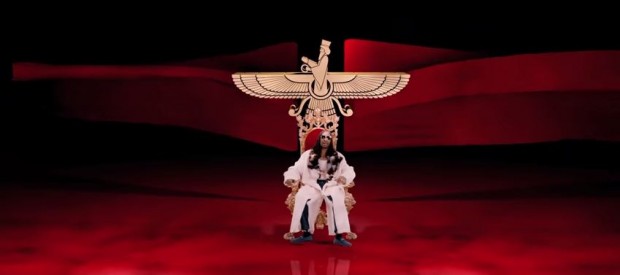Indian Zoroastrians furious over Snoop Dogg music video for Insulting Their Religion
American rapper Snoop Dogg has angered the Zoroastrian Parsi community in India with his new music video, in collaboration with a little-known Iranian-born pop singer, Amitis.
The video was released in June by Amitis, co-starring Snoop Dogg. The low budget video shows the two luxuriating amid flashy props and set pieces, reminiscent of an ancient Persian royal court, smoking weed, and watching some almost-naked pole dancers.
In one scene, Snoop smokes a blunt while sitting on a throne under a gold Faravahar, the most sacred symbol of the Zoroastrian religion and an image frequently associated with Persian history.

In this still from the video, Snoop smokes a blunt, sitting on a throne under a gold Faravahar, the most sacred symbol of the Zoroastrian religion and an image frequently associated with Persian history. This imagery enraged Indian Zoroastrians, leading them to file a complaint in the high court.
Among the world’s oldest monotheistic faiths, dating back some 3,500 years, Zoroastrianism began in what is now Iran, and some still practice the religion there today. An estimated fewer than 200,000 believers remain worldwide. Among them are members of the Parsi ethnic group in South Asia. Darayas Jamshed Bapooji, president of the Parsi Zoroastrian Association of Kolkata, a civic organization in the Indian state of West Bengal, watched the music video after receiving angry emails about it and decided to take action. He filed a civic complaint in a municipal high court in Kolkata alleging that the video infringed on Parsi’s “constitutional rights” and that the government should therefore ban its distribution.
“We want the video removed, and they will have to apologize for having put it up in the first place — that is the very least we can hope for from them,” Bapooji told Foreign Policy. “It’s not right, just because we’re a minority. If you did it to the Muslims and the Hindus, there would be riots here.”
He called on the court to protect the feelings of the Parsi community. In India, hate speech laws have been used in the past to prosecute cases of blasphemy or religious insult.
“We don’t mind people making fun of us jokingly; we are quite humorous,” he said. “But that doesn’t extend to our religion.”
The legal standing of the claims remains uncertain, but the Indian penal code does criminalize speech that promotes “enmity between different groups on ground of religion” or is otherwise “prejudicial to maintenance of harmony.”
There were no comments from either artists about the controversy.
The court in Kolkata is slated to hear the case on July 17.
Below, you can watch the official music video:



























































